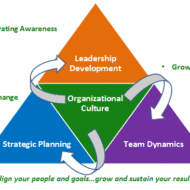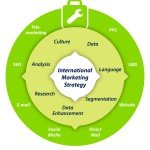Posted by Managementguru in Entrepreneurship, Human Resource, Organisational behaviour, Principles of Management, Training & Development
on Mar 31st, 2014 | 0 comments

Defining Organizational Culture Business is an integral part of the society; and it influences other elements of the social system, which in turn affect business. The entire sphere of business activities are influenced by the social structure and culture of a society. The social system is influenced by the way the business functions, innovations, transmission and diffusion of information and new ideas etc. Business activities have greatly influenced social attitudes, values, outlooks, customs and traits. However, it is very difficult and, in some cases, almost impossible to change many elements of the social environment in the short run. Hence, a business may have to anticipate and adapt to these uncontrollable external environments. Socio-cultural environment refers to the influence exercised by certain social factors, which are “beyond the company’s gate“. This includes attitude of people towards: Work Wealth Knowledge Family Marriage Religion Education Ethics and social responsibility of business. Belief System Influencing the Action: Culture is something that is evolved in a society over a long period and it represents the unified belief system of a large group of people. An organization can be distinguished from another by way of its culture, since organizational culture is unique in its perspective and methodology. When people from different social backgrounds are made to work under the same roof, a corporate organization acquires a distinct culture. Culture conveys a sense of identity for the organization. It facilitates the generation of commitment to do something noble than one’s own self-interest. Cultural Differences: As business go international, the need for understanding and appreciating cultural differences across countries is essential. Any move from one country to another will create a certain amount of confusion, disorientation and emotional upheaval. Especially, people form Asian countries that migrate to the west are subjected to what is called a “culture shock”, in terms of attitude, working style, language, way of life, dress codes and negotiating styles. Freshers may adapt to these changes quickly, since they are natural and easy to be trained. The problem arises with individuals who had been working under a totally different cultural setup from that of the new cultural environment; they will have to undergo the process of ‘unlearning‘, which is more like swapping old ideas for new ideas. This change process is what both the employees and the management find challenging; but ultimately what needs to be done has to be done. Culture Shock: Multi national and Trans national companies, which have business establishments in different parts of the world, must be prepared to cope with the culture shock. Since huge investments go into their projects, they have to think and analyze about the cultural and social aspects that have a definite impact on the working of organisations. For example, the work attitude of employees in the west might lay emphasis on services and results, oriented towards self-improvement; while that of the Asian counterparts may be patience and sacrifice rooted in emotions and loyalty. Business can be considered as a large social network serving to satisfy economic and social interests; culture acts as the social glue that helps hold the organization together by providing appropriate standards for the behavior of organization members. Slogans of Some Reputed Organizations in the Industry: Nokia: Connecting people Jet Airways: The joy of flying Reliance Industries: Growth is life Citibank: Your citi never sleeps The above cited examples give you a fair idea about what a particular company stands for. The orientation of these companies, expressed in the form of SLOGANS contributed to the successful conduct of their...

Posted by Managementguru in Business Management, Economics, Principles of Management, Strategy, Technology
on Mar 26th, 2014 | 0 comments

Technological Impact on Business Environment and Society The tremendous technological growth that is being witnessed is made possible through extensive programmes of technological research being conducted by many types of researchers working within universities, business, and non-profit research organizations. Technological developments are strong and all pervasive forces of the business environment. Technology is the scientific knowledge to practical problems. Technology feeds on itself and it affects business in two major ways: Through its impact on society in generalThrough its direct influence on business operations and activities. Technology and Economic Growth: Technology affects society. In fact, we feel its effect in our everyday lives. It affects economic growth, our standard of living and our culture. However, some of the effects of technology are highly beneficial and some detrimental. These effects on members of the society may in turn affect business practices. We are surrounded by so much of technology, that we take it for granted and usually do not realize how much it affects us until we have to do without electricity, water, transport or telephone. Technological developments have raised the standard of living. In spite of inflationary pressure and considerably a high degree of unemployment, generally families eat better, wear a wider variety of clothing, and live in more comfortable homes. Technology and Lifestyle: Technology also influences basic aspects of our culture, including religion, education, mobility, health care, art, language, laws and their enforcement. For example, technological advances in health care allow physicians to treat their patients in a virtual environment through video conferencing, which again is helpful in legal environment too for the judges to proceed with investigations on hard core criminals, who need not be produced before the court for security reasons. Creative Destruction: Every new technology is a force involved in creative destruction. Say, television hurts movies, synthetic fibers are considered rival for cotton fiber. The discovery of new technology even sometimes affects economic growth-TV with its high entertainment value takes away productive hours of mankind. Each new technology creates major long term consequences, which are not always foreseeable. How do you justify nations spending more money to develop missiles, nuclear weapons and bombs for the sake of security? Developing nations have to buy technology from foreign countries, as they are not resourceful in terms of capital needed for Research and Development, expertise, patents, licenses, and equipments and so on. This transfer of technology involves huge costs as a result of which a vicious circle is formed, in which weak technology creates dependence and dependence creates weakness. Conserve, Reduce, Recycle: The recent trend can be enumerated through this slogan, “Conserve, reduce and recycle”. The stress today is on clean production measures, advanced robotics, zero-emition vehicles, material recycling and alternative fuels and materials. This change towards love for environment by the technologists is a sure sign of positive...

Posted by Managementguru in Business Management, Decision Making, Human Resource, Labor Management, Strategy, Training & Development
on Mar 23rd, 2014 | 0 comments

INDUSTRIAL RELATIONS STRATEGY THE INDUSTRIAL DISPUTES ACT, 1947: An Act to make provision for the investigation and settlement of industrial disputes, and for certain other purposes. It is a universally accepted fact that maintaining industrial peace is of significant importance as it yields higher productivity and arrests industrial unrest. Conflicts manifest themselves in the form of strikes, poor productivity, absenteeism and attrition. These are symptoms of growing conflicts which the management has to weed out right at the start and remove the discontent amongst their employees. Relationships can always be complex or they can always be simple depending on your attitude, how you look at it. In a larger scale, definitely it is a complex phenomenon that has to be dealt with utmost care, as feelings and emotions take lead during problem situations and logic and discipline are conveniently forgotten. Employee Participation: Employee participation is the only way to promote industrial democracy and peace. In course of time it becomes a business strategy and takes the shape of self-management when the pressure of management is eased out to a larger extent. Always remember that the confidence on your workers proves to be the key that opens the door of trust and reciprocation. Workers also understand the storm and turbulence that the management experiences in terms of finance and selling. Proper Training: Proper training given to the heads of various departments in terms of attitude, language, behavior, presence of mind and employee motivation helps the management to avoid unnecessary conflicts. Training given to the union leaders of various capacities on the other hand boosts up their confidence and make them feel as “one” with the management. Social relations are always not to be taken for granted as it determines your integrity and success in the business society. Some golden rules or strategies to make your working smooth and avoid conflicts and strikes. (Works out for both sides) Put yourself in other man’s shoe to know or understand why the other side has taken that particular “stand” or position and many a time we come to know it is only due to misguided apprehensions, mistaken beliefs or just fear of change that is an inherent quality in humans. They resist change as it is simply their habit. The negotiator who represents your side should be agreeable, affable and he should be able to project your ideas and claims in a proper manner and also he should protect your interest. See to it that he doesn’t fall bait to some attractive offers from the other side. Approach the problems with an “open mind”; don’t give space for rumors and gossips. Let the conversation between you and your opponents (not enemies) be fair and square and straight forward. Also don’t try to beat around the bush as it is a colossal waste of useful time and energy and of course your hard earned money. Consider union as a partner and not a “necessary evil”. You have to “work-with” and “live-with” them. In fact smooth relations make work easier and concern for the welfare and security of your employees make them come closer to you and contribute more in terms of productivity. Identify the anchor persons who can be dealt “in person” to make things easy for both sides and find out what their very idea of negotiation is, to finish the deal with minimum effort. The management must create a sense of belongingness in the minds of employees. Survival and success of an organization depends solely on the very survival and success of their workers who believe that work is...

Posted by Managementguru in Human Resource, Motivation, Organisational behaviour, Principles of Management, Training & Development
on Mar 18th, 2014 | 0 comments

Promoting Effective Communication in the Work Place A purpose or an idea to be conveyed is needed for communication to happen. The question is how well or how successful you are in transmitting the message (mind you! without transforming it) to the receiver in the proposed meaning, whatever the channel might be! Communication must serve the following functions… Effective Control Motivational expression Information Fundamentally communication helps in controlling the behavior of the members of an organization in several ways. Either formal or informal, it controls the activities of the employees by prescribing certain procedures of communication to be followed when there is a grievance or a difficulty regarding his/her job, the work situation etc. Communication provides Vital Information: Communication also motivates people by clarifying what needs to be done, how to be done and how they are performing and what can be done to improve their performance. Most important function is that communication provides vital information that is crucial for members at all spans or levels to make effective decisions. The feelings of members are also articulated as grapevine in an organization, and in a way it serves as an outlet for their emotional expression. Grapevines: Grapevines are always not harmful, they might even give you information about the pulse of people working for you and if you are really sharp, “you can work it out to your advantage. Communication is always referred to as “oxygen”, we can feel only when it breaks down. Communication plays an important role in managerial and organizational effectiveness. Nevertheless, on the other side it can be the root cause of all the problems in your organization. This excellent infographic on Business Etiquette and Body Language Blunders clearly indicates how body language and gestures influence communication to a greater level. Source: www.thewebsitegroup.uk Effective Communication: In general, effective communication is the prerequisite for any healthy organization and the attainment of its standard objectives. Most of us are in fact aware of how our vocabulary has been modified to reflect political correctness. For instance we have replaced certain words like handicapped, blind and elderly by physically challenged, visually impaired and senior. One must be sensitive to others feelings. Words are the primary means by which people communicate; so due importance must be given for politically correct words both in the society at a larger level and in firms at the micro level. Increasingly, I find people like being addressed by their designation capacities. Even people might get offended if you call them by their first names as it is regarded to be disrespectful. But I think it is always better to address a person giving due respect to his position if you are reporting to him. That way there is no scope for conflicts and strained relationships. Western countries are more modern in their outlook and have a broader perspective on human interactions than the east. Gestures: Words mean different things to different people. In organizations, people of different background work together, so they have their own language of expressing their opinions and ideas. So it calls for a uniformity of language that is well understood and appreciated by all. Gestures also play their part in communicating ideas. So self controlled expressions, proper behavior are also necessary that completes a communication process. Ultimately proper communication leads to… Satisfied employees Effective feedback Organisational efficiency Freedom for suggesting ideas Enhanced interpersonal relationships Closely knit organisational network Encouraging trust and openness. Communication is an on-going process and the purpose is “not to dictate but to make the employees understand the big picture” as to how the process imparts success and viability to the...

Posted by Managementguru in Business Management, Entrepreneurship, How To, International Business, Marketing, Project Management, Sales, Startups
on Mar 11th, 2014 | 0 comments

Export can be in the form of merchandise (goods) or services (invisibles). When an entrepreneur wants to spread out his scope of business activity beyond the territory of his nation it is called export, whence he has to prepare himself to confront the challenges prevailing in the global market. How to go about Export? Business by itself calls for discipline whether you talk about your credit policy, quality of your product or services, on time delivery, payments, fund rotation, human resources management and the like. The taste of success in the domestic market gives you the necessary confidence to spread your wings far and wide. To be a part of the global market, you are expected to imbibe not only more discipline and order but you should be very thorough about the procedures and policies of the country, to which you are planning to export and the various legal formalities pertaining to your business activity. How to Export From India Pic Courtesy: Procedure to Start Export Business from India What will be your plan of action if your merchandise is disapproved of its quality after reaching the destination or the shipment gets destroyed due to some eventuality? To combat contingencies we have to have a representative working for us in the chosen place of activity who would report and handle the proceedings. Pre-Requisites for Exporting Goods: How many people do you think who have acquired the desire to export their products have a clear idea about the steps involved in starting an export business? First you have to secure the IEC CODE (import export code) from the DGFT (Director General of Foreign Trade) that comes under THE MINISTRY OF COMMERCE AND INDUSTRY. What is IEC Code? Import Export Code (also known as IEC) is a 10 digit identification number that is issued by the DGFT (Director General of Foreign Trade), Department of Commerce, Government of India. Info Courtesy: Shiprocket.in It is also known as Importer Exporter Code. It is mandatory for companies and businesses to obtain this code to start a business that deals with import and export in the Indian Territory. It is not possible to deal with export or import business without this code. While exporting you get the following edge over others: Exposure to forex marketExposure to diversified cultureExposure to varied laws and legal formalitiesExposure to business risks which you must take up as a challenge Having businesses in various countries is better than having all businesses in one country. It saves you during periods of economic recession. You experience market growth by entering into different and new markets; Asian and European markets are flooded with traders from all around the world since these regions enjoy a locational advantage in the world map and well connected through the sea and land. RBI Policies: Exporters must be aware of the fact that RBI policies are very severe when it comes to foreign exchange. So you should have proper informational inputs from the correct source and your capital has to be invested accordingly. Slide Courtesy: Import and Export Policies and Procedures Exploring unfamiliar and exotic markets is very difficult as they are always dynamic. You should see to it that you keep yourself posted with updates on INTERNATIONAL FINANCE, LENDING RATES etc. Also Read: 10 key steps to export success You can make a small business big and beautiful by adding some flavor to it like, Right time to launch your product in the global scenario, People’s preference being given priority by doing some demographic survey, Attractive campaigns and of course Your unendurable passion for business will do the rest to make your venture a successful one. Read...










